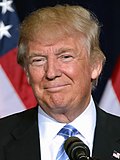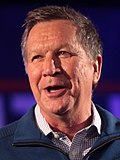| |||||||||||||||||||||||||||||||||||||||||
16 pledged delegates to the 2016 Republican National Convention | |||||||||||||||||||||||||||||||||||||||||
|---|---|---|---|---|---|---|---|---|---|---|---|---|---|---|---|---|---|---|---|---|---|---|---|---|---|---|---|---|---|---|---|---|---|---|---|---|---|---|---|---|---|
| |||||||||||||||||||||||||||||||||||||||||
 | |||||||||||||||||||||||||||||||||||||||||
| Elections in Vermont |
|---|
 |
The 2016 Vermont Republican presidential primary was held on March 1, 2016, along with ten other state nominating contests during Super Tuesday.
Contents
Donald Trump held a big edge in Vermont polls, with John Kasich and Marco Rubio splitting much of the rest of the vote. [1] However, on election day, Donald Trump only narrowly won the popular vote by 2.3%, and tied with John Kasich in the delegate count. Vermont was one of only three states, along with his native Ohio and neighboring Michigan, where Kasich won a county.
This was the only GOP primary contest that Trump won in 2016 that he would lose in 2024, by 4 points to Nikki Haley.



